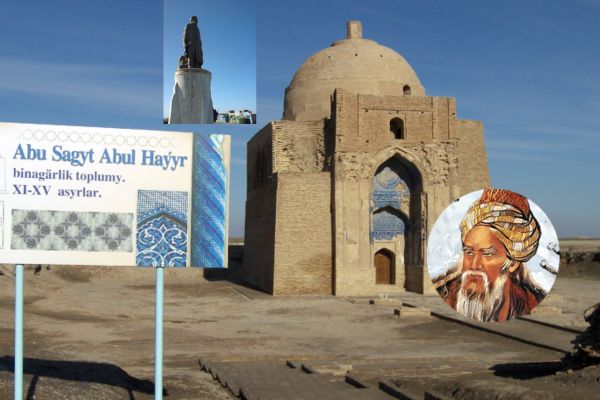Abu Saeed Abulkheir (Abu Sa’id ibn Abi al-Khayr), born in 967 in Mayhana, Khorasan (in modern-day Turkmenistan), was a highly influential Persian Sufi mystic and poet. Known for his deep spiritual insight, wit, and simple but profound verse, Abu Saeed's legacy laid an essential foundation for later Sufi poets, including Rumi and Attar. His life was devoted to the Sufi path of love, selflessness, and unity with the Divine, which he expressed through poetry, teachings, and a life of deep asceticism and humility.
From a young age, Abu Saeed showed an intense inclination toward mysticism and learning. He studied under several prominent scholars and Sufi masters of his time, delving into Islamic sciences, theology, and philosophy, as well as the teachings of early Sufis. His spiritual journey led him to renounce worldly ambitions and pursue a life dedicated to the Sufi ideals of self-purification, divine love, and surrender to God's will. His philosophy was marked by the belief that spiritual enlightenment could only be achieved through the annihilation of the self, or fana.
Abu Saeed’s poetry and aphorisms are simple yet profound, expressing the essence of Sufi mysticism. He often wrote in rubaiyat (quatrains) that explore themes like divine love, inner transformation, and the fleeting nature of worldly existence. His verse exudes a joyful embrace of love, humility, and unity, and is famous for its spiritual intensity and spontaneity. His poetic voice was conversational and direct, aimed at drawing readers into a mystical state of understanding beyond the intellect. This approach helped make his poetry accessible to people from all walks of life.
One of Abu Saeed’s most famous concepts is the idea of tawhid (the oneness of God), which he expressed as a sense of union in which the individual self disappears, leaving only God’s presence. He emphasized the importance of loving and serving others as a way to achieve closeness to the Divine, believing that the path to God lay in compassion, humility, and selflessness.
Abu Saeed's fame grew during his lifetime, and his khanqah (Sufi lodge) attracted many followers, scholars, and seekers. Despite his renown, he remained humble, often shunning public attention and redirecting praise to God. His gatherings included music, poetry, and sama (spiritual listening), encouraging participants to lose themselves in divine remembrance and love.
Though Abu Saeed wrote relatively little, his sayings and poems were collected posthumously by his followers. His teachings inspired not only his contemporaries but also future generations of Persian mystics and poets, leaving a legacy that deeply shaped Persian Sufi literature. His life and words embody the Sufi ideals of love, selflessness, and unity, continuing to inspire seekers of spiritual truth across the world. Abu Saeed Abulkheir passed away in 1049, but his wisdom and vision remain alive in Sufi thought and Persian literature.
Sokhanvar information
Published on Nov. 7, 2024, 7:01 p.m. by @hamed
- Name: Abu Sa’id ibn Abi al-Khayr
- Persian Name:: نام به فارسی
- Alias: Abu Saeed
- Comments: 0
- Views: 1020
Works
Though Abu Saeed wrote relatively little, his sayings and poems were collected posthumously by his followers. His teachings inspired not only his contemporaries but also future generations of Persian mystics and poets, leaving a legacy that deeply shaped Persian Sufi literature.
Books
- No books added yet.

